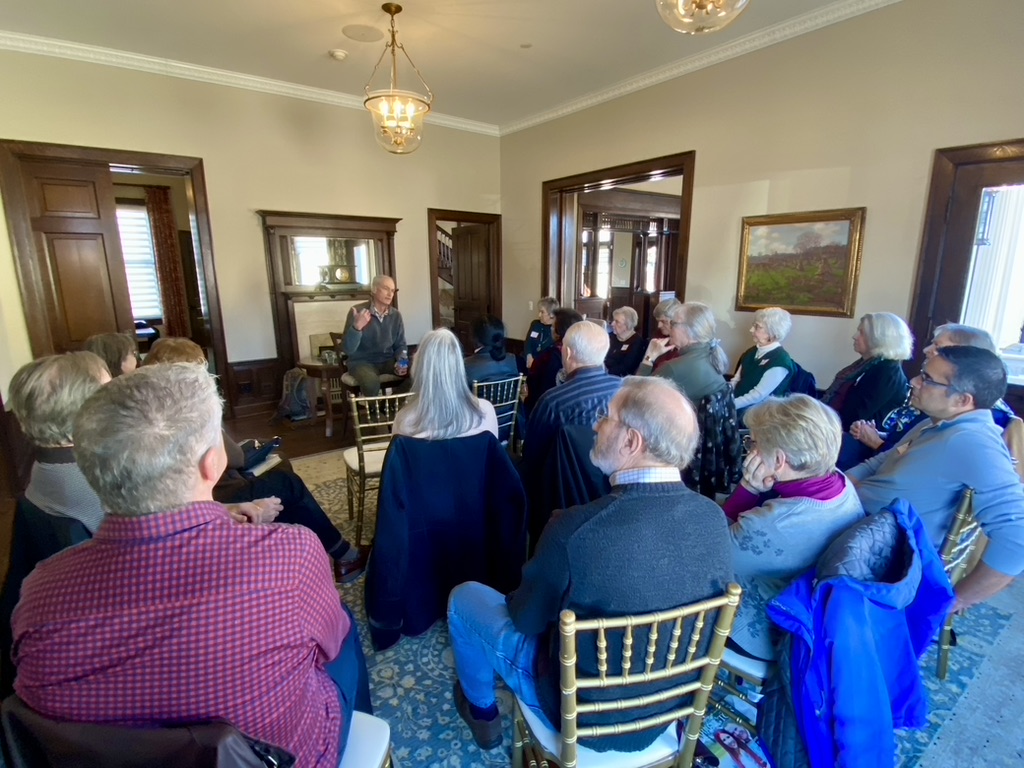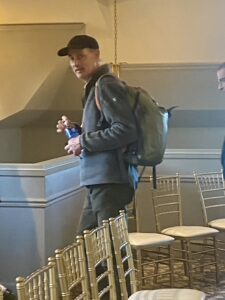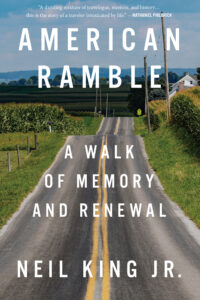By Mary Klest
Neil King Jr., author of American Ramble and former journalist at the Wall Street Journal, walked into Barrington’s White House with a smile on his face and a backpack slung on his left shoulder. His book describes a journey he took on foot from Washington DC to New York City. After many interviews with newspapers and tv, he was excited to talk with members of the Barrington Writers Workshop about the craft of writing. This was his first and thus far only writers group audience. In an intimate setting he began by telling us that his interest in observation was with him even as a boy. He kept a journal and chronicled his days. After leaving the WSJ and having received a cancer diagnosis, he intended to explore a more personal form of writing and living simply with focused attention during his walk. But the pandemic delayed his start date for a year.

Neil King Jr. talking with members of the Barrington Writers Workshop at Barrington’s White House.
I’ve broken down some of the key ideas he talked about that we as writers can all benefit from. BWW members in attendance can share some of their take-aways in the comment box below. Here are some of mine.
Be committed
King spent the time during the COVID-19 lockdown researching and planning. He didn’t give up on his idea. He knew the story structure. He talked with potential publishers before embarking on the journey. They asked why anyone would want to read about his walk. He told the group to be ready with an answer to that question. The folks at HaperCollins liked his answer. Even if he had not found a publisher, his commitment was so strong he said he would have self-published.
Create a persona
He was the author yet he had to look at who he was as narrator of the story. Would he be likable, trustworthy, a good storyteller? This portrayal of himself needed some personal scrutiny, so he took time to think about it. This is part of the writer’s craft – who’s telling the story?
Build and keep momentum
His is a linear story, starting at one place and ending at another but he introduces characters, landscapes, and history in “nuggets” to keep the reader’s interest. He was careful not to get bogged down in too much detail on any one subject since we all know reader attention can wane. He weaved threads throughout the book that would build upon each other. King also talked about how the Greeks held two concepts of time, chronos (quantitative, chronological) and kairos (qualitative, untethered). He uses both in a satisfying way to keep the reader moving with him.
Review / edit
King shares his first draft with ten people he knows to get their feedback before sending his work to an editor. A veteran writer, he didn’t worry about his writing but remained open to feedback. “It’s amazing how moving one sentence into a paragraph or spreading things out can make music.” His first editor left the company after two drafts. King was given another younger editor who he asked to review it for anything “cringeworthy.” He was satisfied with the editing process and proud of the finished product.
King didn’t write for the market. He followed his interests. His authenticity shows in the book and during his talk. Of time, territory, people and places he said: “It’s there for any of us.” He ended the session with a quote from Mary Oliver: “Attention is the beginning of devotion.”




